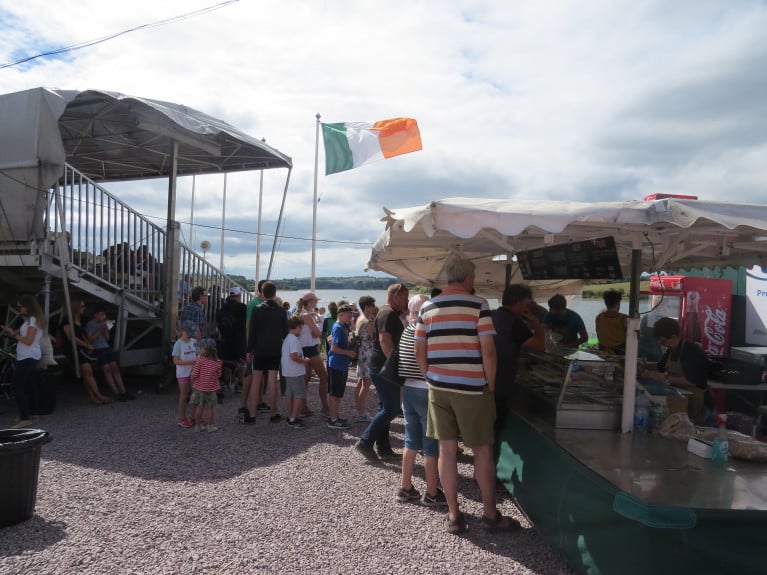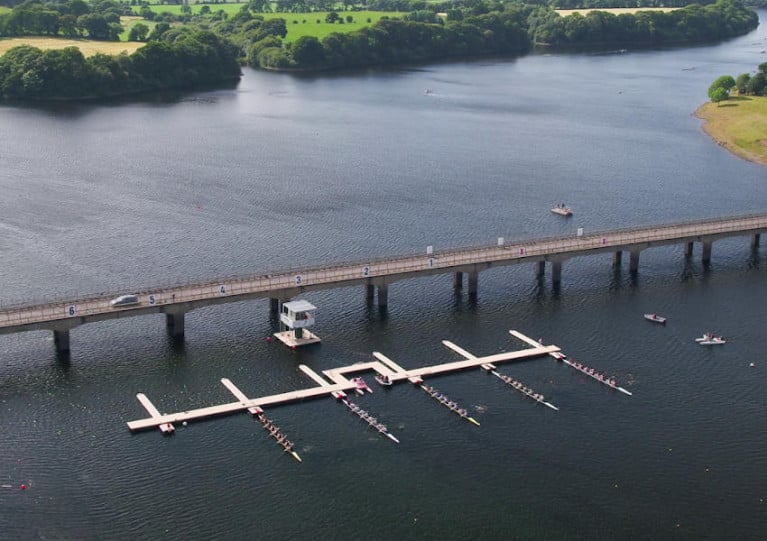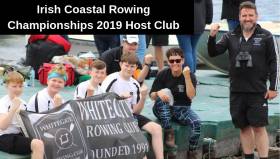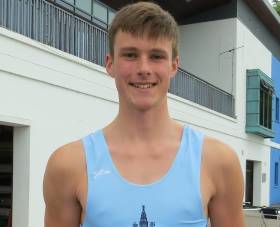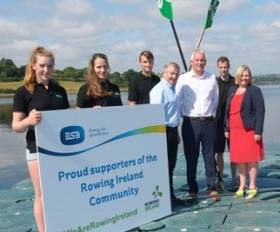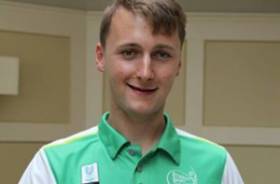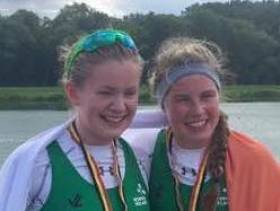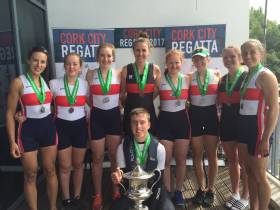Displaying items by tag: National Rowing Centre
Corrib Head of the River, the rowing event scheduled for Galway on Saturday, has been cancelled because the flow of the river is too strong to safely hold the event. This means that all seven heads which should have been held this year have been cancelled.
Meanwhile, Rowing Ireland has announced that it will limit access to the National Rowing Centre to high the Olympic training squad, coaches and “essential staff”.
Rowing Ireland says that no one outside this group will be granted access until April 5th, when the decision will be reviewed.
Development camps, trials for under-23 and juniors and club and schools activities will not be allowed.
National Rowing Centre Gets €600k For Upgrades Under Large Scale Sport Infrastructure Fund
The National Rowing Centre is among 25 initiatives benefiting from a €77.4 million cash injection under the new Large Scale Sport Infrastructure Fund (LSSIF).
The Cork facility, advocated by Cork County Council and Rowing Ireland, is on the provisional list to receive €613,049 towards a total cost of €908,220 for the urgent upgrade of water training amenities (slips and pontoons and rowing course), the racing course and access.
The first set of allocations under the LSSIF was announced yesterday (Friday 10 January) following what the Department of Transport, Tourism and Sport said was “a rigorous assessment process”.
All applications required support by a national governing body or local authority, with priority given to those judged likely to increase participation or audience, boost performance and/or improve access for people with disabilities.
All listed projects in Stream Two will now undergo further assessment and a due diligence procedure. Stream One allocations will be announced shortly.
#Rowing: Whitegate Rowing Club are delighted to have been selected to host the 2019 Irish Coastal Rowing Championships. This event is one of the largest rowing regattas in Ireland and it is an honour for the club to have been nominated as this year’s host club.
The event will take place on the weekend of August 23rd and 24th and it will be held at the National Rowing Centre, Farran Woods.
The committee of Whitegate Rowing Club cordially invites our local community, club supporters and anyone who simply loves sports to the launch of their hosting of the Irish Coastal Rowing Championships at their cubhouse in Whitegate, Co. Cork on Saturday, April 20th at 6.30 pm.
This launch event coincides with a club open day, where those interested in taking park in the sport are more than welcome to come along and find out what it is all about! The open day runs from 5.30 pm to 7.00 pm and light refreshments will be served
Club Chairperson Rachel Barry said: “Coastal rowing is a fantastic sport and our members range from junior rowers of 10 years, right up to our Masters members (over 55) with incredible experience. We work hard to promote the sport of coastal rowing and are extremely proud of our club’s ethos of inclusion and strong sportsmanship. To be selected to host this year’s Championships is a huge honour and a matter of pride for our local community.”
Whitegate Rowing Club is one of east Cork’s premier coastal rowing venues. The club have been rowing out of their base at the Sawmills in Whitegate since 1991. The club are now looking forward to hosting their third All Ireland Coastal Rowing Championships and have a reputation as a strong and successful club in the sport of coastal rowing.
WRC’s mission is simple: to train and instruct members in the sport of Coastal Rowing. The club strives to foster, promote and develop the sport and create a positive and encouraging environment for all.
Dorney and Lynch top Junior Rankings at All Ireland Open and Youth Regatta
Jack Dorney of Shandon won the junior 18 single sculls at the Irish Open and All Ireland Junior Regatta at the National Rowing Centre in Cork today. His nearest rival was James O’Donovan of Castleconnell. Both represented Ireland this season and both are junior again for the 2019 season.
Aoife Lynch of Lee was the top junior woman, just ahead of Lauren O’Brien of Castleconnell.
The best women’s open pair of the day was the UCC/Skibbereen combination of Tara Hanlon and Niamh Casey.
ESB Backs Rowing Festival at Inniscarra
#Rowing: ESB has teamed up with Rowing Ireland to support a series of prestigious rowing regattas on Inniscarra Reservoir this month. The Coupe de la Jeunesse, from July 27th to 29th, will attract talented young rowers from 13 countries across Europe. Up to 750 rowers and their support teams are expected in the Cork area for this high-profile event. The event is open to rowers who are 18 years or under. The Festival of Rowing programme also includes the Irish Rowing Championships taking place this weekend, July 13th to 15th, as well as the Home International Regatta which takes place on July 21st.
Rowing Ireland CEO Michelle Carpenter said: “We are delighted with the ESB support of our exciting Festival of Rowing which commences this weekend with the biggest ever Irish Rowing Championships. The relationship between the ESB and Rowing Ireland has been pivotal and we are delighted to have them support our celebration of Irish and International here at our High Performance home in Inniscarra.”
Frank Barry, Plant Manager at ESB’s Lee Stations said: “In what is a milestone month for the rowing community, ESB is delighted to support Rowing Ireland in their hosting of these three upcoming regattas on Inniscarra Reservoir. This support builds on our long-standing relationship with the rowing community. In 2011, ESB entered a 25 year lease with Rowing Ireland which has facilitated development of world-class infrastructure at the National Rowing Centre. As such, the facilities at Farran provide a fitting backdrop as we welcome the international athletes for the 2018 Coupe de la Jeunesse in particular. On behalf of ESB, I wish all participants the very best of luck in these prestigious events.”
Cork County Council and Fáilte Ireland are also providing support for the events.
Cork Welcomes Coupe de la Jeunesse 2018
#Rowing: The Coupe de la Jeunesse will be hosted by Ireland this year. Young rowers from Austria, Belgium, Czech Republic, Denmark, France, Great Britain, Hungary, Italy, the Netherlands, Poland, Portugal, Spain, Switzerland and all across Ireland will compete at the National Rowing Centre from July 27th to 29th.
The Coupe de la Jeunesse is an annual international junior rowing regatta. The event, which was founded in 1985, is open to rowers 18 years or under. Points are awarded to nations based on finishing position in each category. As a result, a strong overall team is required to take overall victory at the Coupe. The event has only ever been won by Britain (14 wins), Italy (11 wins), and France (8 wins). Each category is raced separately on the first and second day of the regatta, allowing for different Coupe de la Jeunesse event winners on each day.
Ireland performed exceptionally well last year, highlighting our young talent in this growing Irish sport, bringing home a total of five gold medals across the women’s pair and men’s quadruple categories.
Rowing Ireland has been a proud member of the Coupe rowing family for many years and hosted this event in 1999 and 2008. The regatta, which encourages young rowers, has become a platform in Ireland for starting the international careers of some of our most successful and decorated Irish rowers such as Gary O’Donovan and Shane O’Driscoll.
Cork County Council is supporting the event. During his welcoming address, County Mayor Declan Hurley has urged those taking part in the Coupe de la Jeunesse to take the opportunity to explore Cork during their downtime.
“I would like to welcome all the visiting athletes, their coaches, families and supporters to our great county and commend these young rowers for the hard work, passion and dedication that has brought them here. While this is a competition, I wish to remind all participants to take some time to enjoy all that this county has to offer. Cork is truly a remarkable place with so much to do, see and experience. Go and kiss the Blarney Stone; take a trip on the Dursey Island Cable Car, running 250m above the sea; visit Mizen Head, the most south-westerly point in Ireland or sample some mouth-watering Cork artisan produce. There is so much to do in our beautiful county, I hope you enjoy each and every minute.”
Michelle Carpenter, the new chief executive of Rowing Ireland, said: “We are so excited to welcome young rowers from 13 countries across Europe to our fantastic home here at the National Rowing Centre in Farran Wood this July. To have the pleasure of announcing Ireland as host of this prestigious race as one of my first roles in my new position as CEO is such an honour. This is an event which I hold dear to my heart as I have been heavily involved in the Coupe for the last four years and have witnessed first-hand what a great opportunity this is for up and coming young rowers to grow.
“Rowing is such a historic sport, but beyond that, its reliance on teamwork and seamless synchronization forms bounds of friendship and family that really stand the test of time. If you can battle the waters together, you can achieve anything! I cannot wait for Cork to open its arms once again to the visiting Coupe family. While rowing is where the excitement lies, competitors and their families are always blown away by Cork’s friendliness, culture and scenic nature. I have no doubt our great county will pull out all stops, as always, to support our competitors, both home and foreign, this July.”
Young Irish athletes are competing to secure a place on the 2018 Coupe de la Jeunesse team. A crucial trial is taking place on Friday 18th May, after which the selection panel will review these young rowers’ performances, and also take into account their previous rowing history.
The National Rowing Centre in Farran Wood acts as the base for the Ireland high performance team. The course facilities have been upgraded in recent years and now consist of an Albano course with adjustable start, split timing and photo finish system.
Snow Strands Dukarska at National Rowing Centre
#Rowing: Monika Dukarska and coach David McKenzie McGowan have been snowbound at the National Rowing Centre for four days. The Ireland international trained on the lake on Wednesday but her car has been snowed in and she sees little chance of leaving the woodland venue until there is a thaw. The venue has multiple sleeping quarters and both have water, food and electricity – but they are short of bread. They scratched out a plea in the snow in the front of the boathouse.
Goff and Byrne and Pair of Hegarty and Hanlon Shine at Trial
#Rowing: Andrew Goff of UCD and Ronan Byrne of UCC impressed in the six kilometre time trial at the Ireland Assessment at the National Rowing Centre today. Goff, an under-23 lightweight, came out on top overall in the rankings when given weighting for his class, while Byrne was second, and was the best under-23 heavyweight.
The UCC under-23 women’s pair of Emily Hegarty and Tara Hanlon made their mark, while Monika Dukarska impressed in the women’s single. Sanita Puspure missed the trial through injury.
The trial was run in a strong – and rising – headwind and there is a very limited programme tomorrow, Sunday.
Ireland Trial, National Rowing Centre
(Six kilometre time trial; selected results; ranked by percentage of projected world best time)
1 A Goff (UCD; under-23 lightweight single) 24 mins 00.3 secs (83.32 per cent), 2 R Byrne (UCC; under-23 single) 23:44.1 (83.0), 3 J McCarthy (Skibbereen; u23 lwt single) 24.18.9 (82.25), 4 R Ballantine (Newcastle/Enniskillen; lwt single) 24:23.1 (82.02)
5 S Mulvaney, D O’Malley (UCD; u-23 lwt pair) 23:06.0 (81.82), 6 E Hegarty, T Hanlon (UCC; under-23 women’s pair) 25.14.5 (81.81), 7 A Crowley, A Keogh (UCC/Old Collegians; women’s pair 25:04.3 (81.17), 8 M Dukarska (Killorglin; women’s single) 26.07.4 (81.15), 9 A Harrington (Shandon/UCC; single) 23.54.6 (81.14), 10 A Casey (Skibbereen; u-23 lwt women’s single) 27:05.8 (80.45).
McGirr and O'Reilly in Form at Ireland Junior Trial
#Rowing: Jack Keating of Carlow was the fastest single sculler and Ciara Browne of Workmans the fastest woman on the first day of the Ireland junior trial at the National Rowing Centre. Enniskillen crews placed first and third in the men’s pairs, while Gill McGirr and Ellie O’Reilly of Fermoy were the fastest women’s pair by over half a minute.
Stars Come Out for Huge Irish Rowing Championships
#Rowing: A bumper weekend of racing is in store in Cork as the 2017 Irish Rowing Championships take place at the National Rowing Centre from Friday, July 14th to Sunday, July 16th. The event will showcase some of the best rowing Ireland has to offer with 1049 crews competing in 264 races.
The National Rowing Centre will welcome 60 clubs, including Waterville and Flesk Valley, who will compete at the Championships for the first time, as well as a re-formed Newry Rowing Club.
High Performance athletes including Gary and Paul O’Donovan, Sanita Puspure and Claire Lambe will be among those competing for the much coveted “Pots”, as well as European Champions Shane O’Driscoll and Mark O’Donovan, and European Silver medallist Denise Walsh.
Three superb days of racing were enjoyed at last year’s Championships, which came to a spectacular end with the men’s senior eights being fought right to the line. Commercial Rowing Club came away with the “Big Pot” in the end after a thrilling race, which saw them finishing less than a second ahead of rivals UCD.
Skibbereen, in combination with UCC, won the women’s senior eight. That win took Skibbereen’s overall tally for the Championships to 13 – they now have 163 titles in total, 11 clear of nearest rivals, Neptune (152).



























